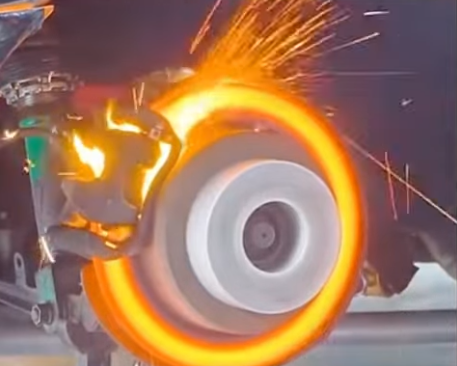
Proper winter brake maintenance can mean the difference between safety and disaster on Quebec roads. At Autotech Performance, we provide expert maintenance services to West Island drivers. Therefore, we understand what it takes to keep brakes performing optimally in extreme winter conditions.
At Autotech Performance, brake maintenance increases significantly during winter months. For instance, road salt accelerates wear on brake components. Moreover, freezing temperatures demand special attention to brake fluid maintenance. Plus, our harsh Quebec winters require more frequent brake inspections.
Consider this:
Regular brake maintenance isn’t just about safety—it’s about prevention. However, winter conditions make standard maintenance schedules inadequate. Snow, salt, and extreme temperature fluctuations demand a specialized maintenance approach. Furthermore, proper winter brake maintenance extends your system’s lifespan.
Many drivers underestimate winter’s impact on brake maintenance needs. However, our experience at Autotech Performance proves otherwise. After all, when navigating icy conditions on Sources Boulevard or Des Perrons, properly maintained brakes become your best defense.
In this second part of our winter brake series, we’ll share essential maintenance practices. You’ll discover our professional checklist for winter brake care. Plus, we’ll explain critical maintenance procedures developed through years of serving West Island vehicles. Our goal is to help you maintain peak braking performance throughout winter.
Whether you’re heading to work in Dollard-des-Ormeaux or shopping in Kirkland, proper brake maintenance ensures your safety. Let’s explore the essential maintenance steps that keep your brake system reliable during Quebec’s challenging winters
Winter Brake Maintenance Your Essential Maintenance Checklist
Your winter brake safety depends on regular brake maintenance and careful monitoring. Therefore, we’ve developed this comprehensive checklist at Autotech Performance. Plus, we’ve included critical winter brake safety checks that could save your life during Quebec’s harsh winter months.
Understanding Daily Winter Brake Maintenance:
Every winter morning brings unique challenges to your brake system. For instance, freezing temperatures can affect brake fluid performance. Moreover, your first drive of the day requires special attention to brake response. Furthermore, our West Island winters create conditions that demand extra vigilance in monitoring your braking system.
The core of winter brake safety lies in recognizing early warning signs. Strange sounds during morning drives often indicate developing issues. Additionally, changes in how your brake pedal feels could signal potential problems. Most importantly, addressing these signs early prevents dangerous situations on icy roads.
Monthly Inspection Routines:
Winter brake maintenance requires more than daily attention. Therefore, set aside time each month for a more thorough inspection. Look for signs of brake fluid leaks under your parked vehicle. Additionally, inspect your wheel areas for excessive rust from road salt. Furthermore, pay attention to how your vehicle responds during regular driving conditions.
Your monthly checks should include testing your brakes in safe conditions. For example, choose an empty parking lot to check your stopping distance. However, always perform these tests when other vehicles aren’t around. Plus, monitor how your vehicle responds to gentle brake application in winter conditions.
Professional Winter Brake Safety Checks:
Some aspects of winter brake safety require professional expertise. Our certified technicians at Autotech Performance understand Quebec’s unique winter challenges. They check for issues that most drivers might miss. Moreover, they can spot potential problems before they become dangerous.
Seasonal Maintenance Approach:
Early winter demands a complete brake system evaluation. This inspection ensures your vehicle is ready for the challenging months ahead. Subsequently, mid-winter checks focus on salt damage and ongoing performance. Finally, late-winter inspections prepare your system for spring transitions.
Documentation Matters:
Keeping detailed records enhances your winter brake safety strategy. Track all maintenance dates and noted issues in a dedicated logbook. Additionally, maintain records of any unusual brake behavior during cold weather. This documentation helps identify patterns and prevent recurring problems.
Emergency Preparedness:
Winter brake safety extends beyond regular maintenance. Therefore, prepare for unexpected situations with proper emergency equipment. Keep winter-grade brake fluid in your vehicle for emergencies. Additionally, store essential tools where you can easily access them.
Professional Support:
While many aspects of winter brake safety can be monitored at home, professional expertise remains crucial. Schedule regular inspections with our certified technicians. Moreover, don’t hesitate to bring your vehicle in when you notice changes in brake performance. Your safety depends on properly functioning brakes, especially during our challenging Quebec winters.
Remember, winter brake safety isn’t just about maintenance – it’s about peace of mind. Therefore, following these guidelines helps ensure reliable braking performance throughout the winter season. Plus, regular attention to your brake system protects both your vehicle and your family.
Essential Winter Brake Maintenance Tips
Professional brake maintenance becomes crucial during Quebec winters. Therefore, our Autotech Performance experts have compiled these essential maintenance tips. Furthermore, these practices help ensure your safety during harsh winter conditions.
Brake Fluid Maintenance:
Winter demands special attention to your brake fluid condition. For instance, contaminated fluid can freeze in cold temperatures. Moreover, moisture absorption increases during winter months. Therefore, regular brake fluid testing becomes essential for safety.
Our technicians recommend checking brake fluid every two weeks in winter. Plus, watch for changes in fluid color or consistency. Most importantly, never let your brake fluid level drop below the minimum mark. Additionally, consider a complete fluid flush before winter begins.
Brake Line Protection:
Salt and moisture create a destructive combination for brake lines. Therefore, protective measures become crucial during winter months. Furthermore, regular underbody washing helps prevent corrosion. Plus, special anti-corrosion treatments provide additional protection.
Here’s what our experts check regularly:
- Line integrity along the entire length
- Connection points for potential leaks
- Protective coating condition
- Signs of rust or deterioration
- Flexibility of rubber components
Caliper Care:
Winter can cause brake calipers to stick or freeze. However, proper maintenance prevents most caliper issues. For example, regular lubrication keeps moving parts functioning smoothly. Additionally, cleaning prevents salt buildup around caliper mechanisms.
Professional technicians focus on several key areas:
- Caliper slide pin lubrication
- Piston movement and seals
- Mounting bracket condition
- Boot and dust seal integrity
- Hardware replacement when needed
Rotor and Pad Inspection:
Cold weather affects both rotors and brake pads differently than summer conditions. Therefore, regular inspections become even more important. Our technicians measure pad thickness more frequently during winter months. Plus, they check rotor surfaces for unusual wear patterns.
Salt and slush can accelerate brake pad wear. Moreover, winter driving conditions often require more frequent brake use. Consequently, what normally lasts a full season might need replacement mid-winter.
Emergency Brake Maintenance:
Your parking brake needs special attention during winter. For instance, frozen cables can cause serious problems. Therefore, regular testing and maintenance prevent unexpected issues. Plus, proper adjustment ensures reliable operation in all conditions.
Prevention Tips from Our Experts:
Best practices include gentle brake application during the first few minutes of winter driving. Additionally, avoid leaving your parking brake engaged overnight in freezing conditions. Furthermore, schedule regular professional inspections throughout the winter season.
Remember, winter brake maintenance isn’t just about safety. It also protects your investment in your vehicle. Plus, regular maintenance costs less than emergency repairs. Most importantly, among all maintenance aspects, one component demands special attention: your brake fluid.
Winter Brake Maintenance: What Every Quebec Driver Should Know About Brake Fluid:
Many drivers overlook brake fluid’s crucial role in winter safety. Therefore, understanding brake fluid basics helps prevent winter accidents. Plus, Quebec’s extreme temperatures make brake fluid maintenance especially important.
Understanding Brake Fluid Grades:
Different brake fluid grades perform differently in winter. For instance, DOT 3 fluid absorbs moisture more readily than DOT 4. Moreover, DOT 4 maintains better performance in extreme cold. Therefore, choosing the right fluid grade matters for Quebec winters.
The Moisture Problem:
Winter conditions increase moisture absorption in brake fluid. Furthermore, this moisture can freeze in brake lines. Most importantly, frozen moisture creates dangerous air pockets in your brake system. Additionally, moisture promotes corrosion in brake components.
Temperature Effects:
Brake fluid’s viscosity changes with temperature. For example, cold fluid flows more slowly through brake lines. Moreover, thick fluid affects brake response time. Therefore, winter-grade brake fluid becomes essential for cold-weather safety.
Testing and Maintenance:
Professional brake fluid testing reveals hidden problems. For instance, moisture content testing identifies contamination levels. Plus, regular testing prevents winter-related brake failures. Most importantly, contaminated fluid requires immediate replacement.
Warning Signs – Watch for these brake fluid issues:
- Spongy brake pedal feel
- Changed fluid color
- Delayed brake response
- Low fluid levels
- Burning smell
Preventive Measures:
Regular fluid maintenance prevents most winter problems. Therefore, schedule professional fluid checks every three months. Additionally, keep brake fluid levels topped up. Furthermore, address any leaks immediately to maintain system integrity.
While understanding brake fluid is crucial, it’s just one part of modern brake system technology. Therefore, let’s explore how today’s vehicles use advanced systems to enhance winter brake safety.
Winter Brake Maintenance: Debunking The Myths of “Warming Up Brakes” in Quebec Deep Freeze Winters

Let’s be clear: You don’t need to warm up your brakes in winter. Moreover, attempting to heat your brakes artificially can cause severe damage. For example, this viral video shows brake discs heated to over 400 degrees Celsius until glowing red. This practice can: Warp your brake rotors, Damage brake pads, Compromise brake fluid, Create dangerous situations, Void your warranty.
In this video, a new disc has been installed on a performance car. The handbrake has been engaged, and the accelerator is pressed to full throttle until the internal heat of the disc reaches in excess of 400 degrees Celsius, causing it to glow red. Please, do not try this at home – and again, there is no need to warm up your brakes in winter.
Our tip for safe winter brake operation: Modern brake systems work effectively even in Quebec’s coldest temperatures. Furthermore, normal driving naturally brings brakes to proper operating temperature. Plus, today’s brake components are designed for extreme weather conditions.
What You Should Do Instead:
- Drive cautiously for the first few minutes
- Allow natural warmup through normal use
- Keep your speed appropriate for conditions
- Maintain regular brake maintenance
- Trust your vehicle’s engineering
Let’s review the key points for winter brake maintenance for every Quebec driver
Your brake system faces unique challenges in winter conditions. Therefore, regular maintenance becomes even more critical. Plus, modern brake technologies offer additional safety features when properly maintained.
At Autotech Performance, we understand Quebec winter driving demands. Furthermore, our expert technicians provide comprehensive brake services year-round. Most importantly, we help keep West Island drivers safe during challenging winter conditions.
Some signals to observe when braking: you notice that you take more distance to brake? Does your brake pedal not feel like it used to? Do your brakes make loud noises when you brake? Or do they get a little too hot when you put them to work? All of these could be signs that it’s time to have your brake system checked.
For servicing brake systems in the west island, a good tip: Rely on a recommended CAA garage and use the specialists. To book your vehicle’s check-up with the experts at Autotech Performance Pierrefonds, schedule a reservation online here.
Winter Brake Safety: How Cold Weather Affects Your Braking System (Part 1 of 3)
Winter Brake Maintenance: Essential Checklist and Guide (Part 2 of 3)
Winter Brake Technology and Professional Services Guide (Part 3 of 3)



